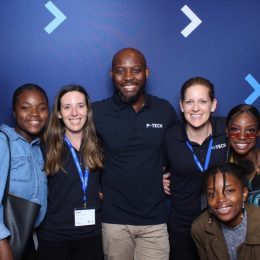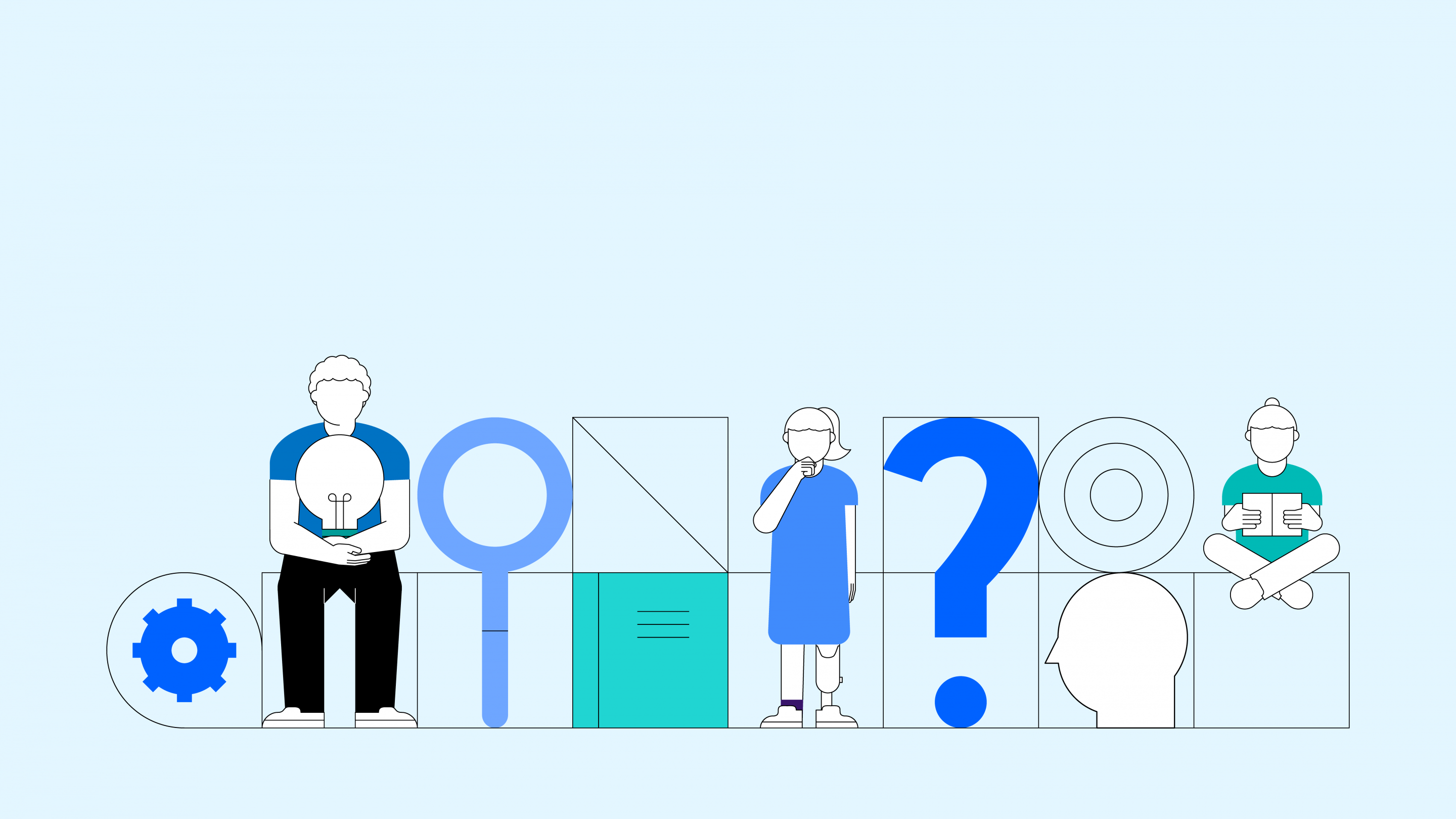Preparing every student for jobs of the future: Q&A with an Open P-TECH exec
Article by Natasha Wahid • February 24, 2021
Joel Mangan, one of the leaders behind IBM’s free digital learning platform, Open P-TECH, discusses the technology-powered jobs of the future, the importance of equitable education, and why he believes Open P-TECH is a critical solution to address current gaps in workplace preparation.
Questions and answers with one of the leaders behind IBM’s free digital learning platform
As with most conversations these days, I connect with Joel Mangan, Executive Director of IBM’s P-TECH, over video. We’re both casual: I in my glasses and an old University of Michigan sweatshirt, Joel in a white t-shirt and grey beanie.
But while our clothes and demeanors are relaxed, our conversation is high stakes. We’re talking about the future of education. And it’s clear from the beginning that that future is something Joel takes very seriously.
Joel is one of the leaders behind Open P-TECH, IBM’s free digital learning platform centered on technology and professional skills. He, along with a core group of IBMers, is determined to bring accessible learning and job preparation to every young person. And when it comes to that mission, Joel is anything but easy-going.
Natasha Wahid: So, how did you get here? To becoming one of the leaders behind Open P-TECH, I mean?
Joel Mangan: For most of my career, I was a consultant. I was focused on helping companies transform their businesses so that they could grow and explore new markets. I landed in Corporate Social Responsibility (CSR) at IBM because I saw the convergence of what we were doing to help businesses transform and what we needed to do to help our communities transform.
At IBM, we understand that our future success is linked to our ability to really prepare our young people and communities to thrive in an economy driven by technologies like Artificial Intelligence (AI) and automation.
We started Open P-TECH as a way to give young people around the world access to the technologies and skills that are transforming work. The technologies that will be incredibly important in their futures. We wanted to connect them with people in the field who are working with these technologies, and to inspire them to consider careers they may have never heard of. We wanted to give them opportunities to learn these technologies and get certifications that would carry weight as they enter the job market.
So, we built Open P-TECH.
N: You mentioned careers young people might not have heard of, that may not even exist yet. Can you explain the gap Open P-TECH is filling in terms of preparing young people for “jobs of the future”?
Joel: In ten years, a huge percentage of the job market will be jobs that legitimately don’t exist today. That means kids who are in high school right now will be doing jobs in just a few years that are just being born, or don’t exist yet at all.
How, in a school or university environment, can you really prepare people to understand this future? Educational institutions often struggle to keep up, to stay on top of the technologies that are going to lead to these new jobs. Whereas we’re plugged into the technology. We can help to bridge the gap because we are industry, we have our finger on the pulse.

We want to help young people actually understand the breadth of what’s in front of them. We want to facilitate early exposure to emerging fields and help them build the skills that are required in these fields.
This is the big problem we’re trying to solve: To show young people where work is moving, the forces driving this movement, and how to be a part of it.
Let’s say you’re a young person considering a career in advertising, for example. You may not know how big a role artificial intelligence and data analytics play in advertising these days. You may not realize that there are tons of options for more technical people within these well-known industries. But there are and there will be more in the next few years.
With Open P-TECH, we want to help young people actually understand the breadth of what’s in front of them. We want to facilitate early exposure to emerging fields and help them build the necessary skills—the skills that are required in these fields.
N: We’ve talked about technology, but Open P-TECH is also really focused on professional skills. What are those skills and why are they a main focus?
Joel: As work transforms really quickly, what we used to call “soft” skills are becoming more and more important. When you are working with new tools and scenarios, fast-changing technology, more experimentation, more virtual and more global collaboration, you need to build some very specific professional skills. What we want to do is provide early exposure to the kinds of skills that can help a young person succeed in jobs in this economy.
There are 10 key professional skills that were identified by the World Economic Forum and they map to the Professional Skills course and badge that we offer on Open P-TECH. These skills are about problem-solving, working with others, technology, and personal development.
It’s important that young people are able to understand emerging technologies and master these skills. One of the things students really walk away with [after engaging with Open P-TECH] is an understanding of what these professional skills are about and what it means to show up in a professional environment.
N: What’s special about Open P-TECH? Among all the digital learning platforms out there, why should students and educators use this one?
Joel: We’re focused on giving young people an easy and accessible way to understand the technologies that are shaping their world. In the platform, you can explore areas like cybersecurity, data science, blockchain. The learning is focused on core technologies that are driving our economy right now. That’s the first thing.
It’s also one of the only platforms where the content is designed for young people, for a 10th grade reading level. It’s built so they can engage with and understand technical content without needing any prior technical knowledge.
And it’s career oriented. Young people are thinking and wondering about their careers. If you’re a young person who knows exactly what you want to do, you can use Open P-TECH to learn more about the subjects that interest you.
But if you don’t know, as is the case for most young people, Open P-TECH really provides a space for exploration. It allows you to see and imagine the working lives of people who are practicing in these professions, and to get a real sense of that before you dig in deep to figure out what you want to do.
For example, young people can go to virtual sessions with professionals who are working in these fields and ask them questions, directly. It’s like career coaching. They can also connect one-on-one with a professional through the mentoring initiatives that we have available on Open P-TECH.
N: What does it mean that the platform is “open”?
Joel: We called it “open” for three reasons. The first reason is that it’s free to use for anyone.
The second is that it brings together quality content from any provider. We have content from IBM, yes, but we also have content from the National Academy Foundation, from Adobe, and other leading companies and education providers. We’re looking for the best content, content that really inspires young people and that they can use.
The third reason is that other education programs can use Open P-TECH to supplement their own programs. We know it’s extremely expensive to provide digital platforms that can support learning at scale. And we know there are so many organizations, non-profits, NGOs, that are really passionate about supporting young people, but they just can’t afford to build their own platforms. They can use Open P-TECH to reach their students around the world; they can add their own specific content to it while benefiting from the content already on the platform.
N: In your opinion, what’s the cost of not getting a platform like Open P-TECH into the hands of young people and teachers?
Joel: It comes down to equity. There are some young people who are going to be ok, no matter what. They have parents who work in emerging fields, who are aware of the coming changes and can advise them. They’re going to go to excellent private high schools and well-known universities where they can access this kind of learning.

[The biggest risk is one] of continued inequity. That we continue to grow an economy that isn’t inclusive, that is leaving people out.
The challenge we have right now is that we’re leaving people behind. People that live in under-resourced communities, who don’t have the same exposure to this workplace transformation, who aren’t getting the same guidance around where to focus their growth or how to gain these really important skills, who don’t have access to networks to provide them opportunity.
From my perspective, this is the biggest risk: that of increasing inequity. That we continue to grow an unbalanced economy that isn’t inclusive, that is leaving people behind.
Which goes back to why the platform is open. We really want to make this available to as many young people as possible, and we focus on reaching high schools and students that have been historically under-resourced. It is the core part of our mission.
N: What do you envision as the future of Open P-TECH? What do you hope for the platform?
Joel: One of the things that’s been really pleasing to see is the number of young people who have completed courses and gotten badges from around the world, in the U.S. and in England, Brazil, India, Turkey, Pakistan, Mexico.
Because, to me, that means there are young people around the world who actually understand, for example, what artificial intelligence is and the role that it’s already playing in their life. They’ve been exposed to discussions around ethics and AI. These are the people who are going to (hopefully) be working in this field in the future. And because of Open P-TECH they’ve already been able to start this journey, informed and connected to a growing network.
My hope is that we continue to reach these young people wherever they are and continue to grow. I’m also hoping to see other companies join us and work with us to make this happen. Right now, I’m very happy to see that we’re reaching young people everywhere in the world, including the U.S.
Interested in Open P-TECH? Sign up for the platform for free and start learning today.
Want to bring Open P-TECH to your school or organization? Learn more here.

